Recognizing the next top seven performers of the 2024 season.
November 13, 2024 by Edward Stephens, Patrick Stegemoeller, Graham Gordon and Alex Rubin in Awards with 0 comments
Ultiworld is pleased to announce our annual Club Awards, continuing with the All-Club Second Team. While we consider both regular season and postseason performance, because of the nature of the Club division, we weight success in the Series and at Nationals above all else. This year, with an uneven regular season, the postseason emphasis is perhaps greater than ever.
Our All-Club teams recognize the top performers across the division. Our First Team and Second Team display the top seven and next seven players who had the best seasons. The Club Awards are voted on by Ultiworld reporters, contributors, and editors.
Player of the Year Award
All-Club First Team
All-Club Second Team
Defensive Player of the Year Award
Offensive Player of the Year Award
Breakout Player of the Year Award
Coach(es) of the Year Award
Club Awards Voting Breakdown
Snubs and Superlatives (Coming soon)
All-Club 2024 Second Team
Adam Rees (Revolver)
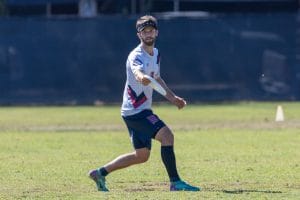
The key to Revolver’s offensive success this season was complementary downfield cutting, and Adam Rees’ gravity was a huge reason for that success. When the handlers would pick up the disc, Rees was often the initiator for the offense. Whether he was eating up a wide open lane for a 25-yard in cut or drawing help on thunderous deep cuts to allow teammates to find open unders, Rees was the engine that made San Francisco’s offense go. It’s no accident that he led Revolver in goals at Nationals, as in addition to his strength as a deep cutter, he was also a consistent finisher in Revolver’s endzone set.
Henry Ing (Rhino Slam!)

After years of playing as a top option on AMP and at Pitt, Ing moved to Portland and shined as one of several top options that led Rhino Slam! to a championship. A steady presence with the disc, Ing was perhaps the most versatile player in the division this season, crossing over to defense to lock down elite opponents while maintaining his penchant for the jaw dropping on offense. Given how quickly he rose to the elite ranks, it’s amazing to think we’re still at the beginning of Ing’s elite club career; he could become a fixture on this list for the next decade.
Jacob Fairfax (Ring of Fire)
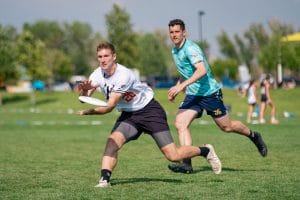
Jacob Fairfax has never quite fit the same mold of other North Carolina players in his generation. He didn’t go to UNC or Carleton, and in fact he never played at College Nationals. He’s not a small ball wizard, his game involves much more stillness then constant motion. But because of those differences, his role on Ring of Fire is even more pronounced, a target man who can somehow be invisible one second (no easy feat given his stature) and then suddenly explode off the page with a scorching cut or towering grab. Ring didn’t design their offense around Fairfax – they don’t need to when he proves to be so effective playing his own way.
Jonny Malks (Truck Stop)
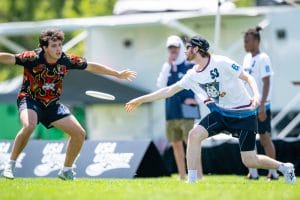
When running mate Rowan McDonnell announced his move to his hometown Boston, Truck’s offense really became Jonny Malks’ offense. Yes, Truck play one of the most egalitarian styles in the division and his teammates are incredibly talented, but Malks was at the center of everything Truck accomplished offensively this season. His ability to break the mark, throw his receivers open, and find the unconventional holes unlocks spaces on the field that make the rest of the offense easier for his teammates. Add in a dynamic athleticism that many center handlers do not have, and Malks paints the picture of a top level ultimate player and a stellar teammate.
Mac Hecht (Revolver)
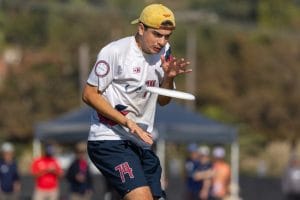
It isn’t complicated. Hecht was the focal point for an offense that was good enough to run all the way to semis. While Revolver benefitted in many ways from their excellent cutting corps and Hecht’s fellow handlers, the performance of the O-line often boiled down to what he could do with the disc in his hand. Launching a huck, hitting an off-balance running backhand, or breaking the opponent’s zone with a hammer within seconds of receiving the centering pass, Hecht had all the answers throughout Nationals.
Quinn Finer (Johnny Bravo)
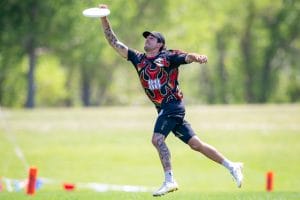
It was another banner season for Finer, who earned his third consecutive All-Club selection. While Bravo’s season didn’t end the way they would have wanted, Finer kept his game firing on all cylinders throughout. As quick as a lizard and always ready to make a stupendous bid on offense and defense, he was kind to highlight reels. More importantly, his steadiness at such a high level was a key fallback option for Bravo. The way things are going, it should not come as a surprise for Finer to find his way back to All-Club again in the coming seasons.
Trent Dillon (Sockeye)
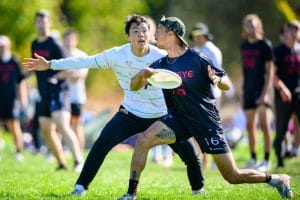
The veteran leader who helped shepherd Sockeye’s revival, Trent Dillon was more than just a mentor for the Declan Millers and Cedar Hineses of the world – he was a world-class player in his own right. Literally, as evidenced by his important role in Team USA’s gold medal at WUC during the summer. Dillon continued to be a do-it-all cutter for Sockeye, as comfortable churning unders as he was taking off deep, at home dishing small ball or launching hucks. All in all it was a vintage season for one of the best players of his generation.